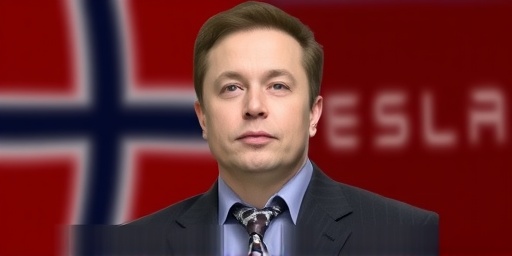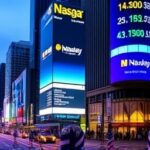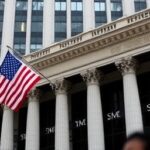In a significant blow to Tesla CEO Elon Musk, Norway’s sovereign wealth fund has become the first major institutional investor to publicly oppose his eye-watering $1 trillion pay package. The Government Pension Fund Global, one of the world’s largest investors with stakes in thousands of companies, announced its decision ahead of Tesla‘s upcoming shareholder vote, citing concerns over excessive compensation and governance issues at the electric vehicle giant.
Norway’s Fund Breaks Ranks with Key Tesla Stake
The decision from Norway’s sovereign wealth fund, managed by Norges Bank Investment Management (NBIM), underscores growing unease among global investors regarding executive pay at Tesla. Holding approximately 0.98% of Tesla’s shares—valued at around $1.5 billion as of recent market prices—the fund’s opposition carries substantial weight. NBIM’s chief executive, Nicolai Tangen, emphasized in a statement that the pay package for Elon Musk “does not align with sound corporate governance principles.” This marks a pivotal moment, as the fund has a history of influencing corporate policies through its voting power on behalf of Norwegian citizens’ oil-funded savings.
Norway’s move is particularly notable because the fund has been a long-term supporter of sustainable investments, viewing Tesla as a leader in the green energy transition. However, recent performance dips and Musk’s divided attention—spanning Tesla, SpaceX, xAI, and his role in the U.S. government—have prompted a reevaluation. “We believe in rewarding innovation, but this level of compensation raises questions about fairness to shareholders,” Tangen added during a press briefing in Oslo.
The fund’s portfolio includes over 9,000 companies worldwide, with ethical guidelines that prioritize long-term value over short-term gains. In 2023 alone, NBIM exercised voting rights on more than 11,000 resolutions, divesting from firms that fail governance standards. For Tesla, this rejection signals potential ripple effects, as other institutional investors may follow suit in the lead-up to the June shareholder meeting.
Unpacking the Controversial $1 Trillion Compensation Plan
Elon Musk‘s pay package, originally approved by shareholders in 2018, was designed as a performance-based incentive tied to ambitious market capitalization milestones. What started as a potential $56 billion award has ballooned to an estimated $1 trillion in value due to Tesla‘s stock surge—shares have risen over 1,000% since the deal’s inception, peaking at more than $400 per share in late 2021 before recent volatility.
The structure includes stock options vesting only if Tesla achieves specific targets, such as $650 billion in market cap (already surpassed) and revenue growth. Proponents argue it has driven Tesla‘s success, transforming it from a niche automaker to a $700 billion behemoth with annual revenues exceeding $96 billion in 2023. Musk himself has defended the package, tweeting in 2024, “This compensation aligned my interests with shareholders—it’s why Tesla leads in EV innovation.”
Yet critics, including Norway’s fund, highlight flaws. A Delaware court in January 2024 voided the original package, ruling it unfair due to Musk’s influence over the compensation committee. The re-vote, proposed by Tesla‘s board, seeks ratification but faces scrutiny for lacking independent oversight. Legal experts estimate that if approved, Musk could claim options worth trillions at current valuations, dwarfing even the salaries of tech titans like Apple’s Tim Cook ($99 million in 2023).
- Key Milestones Achieved: Tesla hit 12 of 12 performance hurdles, including adjusted EBITDA of $15 billion and 20% revenue growth.
- Potential Payout: Up to 303 million shares, equating to 12% of Tesla‘s equity.
- Comparisons: Musk’s base salary is $0, but the package exceeds the combined pay of the top 200 U.S. CEOs.
This escalation from billions to trillions has fueled debates on executive greed, especially as Tesla grapples with slowing EV demand and competition from rivals like BYD and Ford.
Investor Backlash Builds Amid Tesla’s Governance Scrutiny
Norway’s stance is just the tip of the iceberg in a wave of investor discontent. Proxy advisory firms like Institutional Shareholder Services (ISS) and Glass Lewis have recommended voting against the pay package, citing conflicts of interest. Vanguard and BlackRock, which together hold over 14% of Tesla, have yet to disclose positions, but pressure is mounting from pension funds and ESG-focused groups.
In a letter to shareholders, the Council of Institutional Investors warned that approving the deal could “erode trust in Tesla‘s board.” Prominent voices, including New York City Comptroller Brad Lander, who oversees the city’s pension funds, echoed this: “Elon Musk‘s compensation isn’t just outsized—it’s a symptom of unchecked power at Tesla.” Lander’s funds, holding $1.2 billion in Tesla stock, plan to vote no.
Historical context adds depth: Musk’s 2018 tweet calling a funding deal “imminent” led to SEC fines and questions about his judgment. Recent controversies, such as the Twitter (now X) acquisition that cost Tesla shareholders billions in perceived value loss, have amplified calls for reform. A 2024 shareholder lawsuit alleges the board failed fiduciary duties by not negotiating alternatives, potentially diluting common stock by 10-15% if the package passes.
- 2018 Approval: 76% of shareholders backed the plan amid Tesla‘s growth spurt.
- 2024 Court Ruling: Judge Kathaleen McCormick deemed it “unfathomable” without deeper analysis.
- Current Polling: Early votes show 40% opposition, per Tesla filings.
As investors from Europe to the U.S. mobilize, the vote could test Tesla‘s retail-heavy shareholder base, where Musk’s loyalists dominate forums like Reddit’s r/teslainvestorsclub.
Tesla Stock Dips as Musk’s Leadership Faces Heat
Tesla‘s shares fell 3.2% in pre-market trading following Norway’s announcement, erasing $22 billion in market value. Year-to-date, the stock is down 15%, underperforming the S&P 500’s 10% gain, amid concerns over Elon Musk‘s multitasking. Analysts at Morgan Stanley lowered their price target to $310, warning that compensation drama distracts from core challenges like Cybertruck production delays and a 9% drop in Q1 2024 deliveries.
Wall Street reactions vary. Wedbush Securities’ Dan Ives, a Tesla bull, called Norway’s move “overblown,” predicting approval due to Musk’s track record: “He’s delivered 20x returns— that’s worth celebrating.” Conversely, GLJ Research’s Gordon Johnson predicts a “no” vote could trigger a 20% sell-off, as it questions Tesla‘s autonomous driving ambitions, now valued at $1 trillion by optimists.
Broader market implications loom. If rejected, Musk has threatened to shift focus to other ventures, potentially relocating Tesla‘s HQ or AI efforts. This comes as Tesla reports record profits—$15 billion net income in 2023—but faces margin squeezes from price cuts to boost sales in China and Europe.
Employee perspectives add nuance. A Tesla insider, speaking anonymously to Reuters, noted, “Musk’s pay motivates the C-suite, but factory workers see no bonuses while he eyes trillions.” Unionization efforts at Tesla plants in Sweden and Germany, supported by Norwegian labor groups, tie into this narrative of inequality.
Future Stakes: Shareholder Vote and Tesla’s Path Ahead
With the shareholder meeting set for June 13, 2024, in Austin, Texas, all eyes are on turnout. Tesla has rallied supporters through emails and Musk’s social media blasts, but institutional opposition could sway the outcome. If ratified, the pay package might stabilize leadership; rejection could force a redesign, possibly capping Musk’s upside at $100 billion while adding clawback provisions.
Looking forward, this saga influences corporate America. Tech peers like Meta and Nvidia face similar scrutiny on AI-driven executive pay, while ESG investors demand transparency. For Tesla, success hinges on Robotaxi unveilings and Full Self-Driving advancements—Musk promises regulatory approval by 2025, potentially adding $500 billion to valuation.
Norway’s bold step may catalyze reform, ensuring Elon Musk‘s genius aligns with shareholder interests without excess. As Tesla navigates EV market saturation—global sales projected to grow 25% in 2024 per BloombergNEF—the compensation debate will shape its trajectory toward a $2 trillion future or governance pitfalls.
In the end, this isn’t just about dollars; it’s about balancing innovation with accountability in the era of Musk-led disruption.








